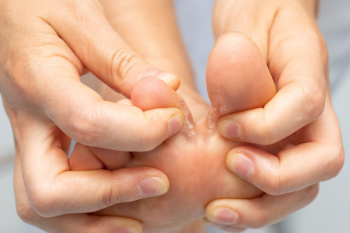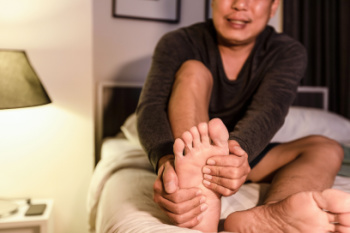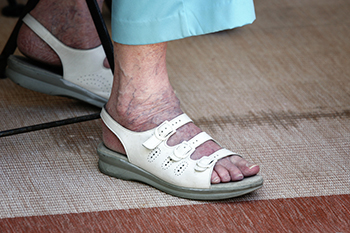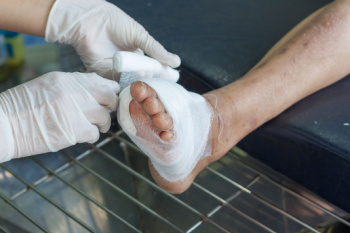Items filtered by date: May 2024
The Impact of Tinea Pedis

Tinea pedis, commonly known as athlete's foot, extends its reach far beyond the realm of athletes. This fungal infection thrives in warm, moist environments, making anyone susceptible, regardless of their athletic pursuits. Individuals who frequent communal spaces like gyms, swimming pools, or shared showers are at highest risk. Preventive measures play an important role in warding off this uncomfortable infection. Keeping feet clean and dry, especially between toes, helps create an unsatisfactory environment for fungi to flourish. Wearing breathable footwear made of natural materials and changing socks regularly can minimize moisture buildup. Avoiding walking barefoot in public areas and using antifungal powders or sprays as a preventive measure can further reduce the risk of infection. Athlete’s foot can be treated by a podiatrist. If you notice signs of this uncomfortable foot condition, it is strongly suggested that you visit this type of doctor who can prescribe medication for effective treatment.
Athlete’s foot is an inconvenient condition that can be easily reduced with the proper treatment. If you have any concerns about your feet and ankles, contact Neeta Hasmukh, DPM from Total Podiatry. Our doctor will treat your foot and ankle needs.
Athlete’s Foot: The Sole Story
Athlete's foot, also known as tinea pedis, can be an extremely contagious foot infection. It is commonly contracted in public changing areas and bathrooms, dormitory style living quarters, around locker rooms and public swimming pools, or anywhere your feet often come into contact with other people.
Solutions to Combat Athlete’s Foot
- Hydrate your feet by using lotion
- Exfoliate
- Buff off nails
- Use of anti-fungal products
- Examine your feet and visit your doctor if any suspicious blisters or cuts develop
Athlete’s foot can cause many irritating symptoms such as dry and flaking skin, itching, and redness. Some more severe symptoms can include bleeding and cracked skin, intense itching and burning, and even pain when walking. In the worst cases, Athlete’s foot can cause blistering as well. Speak to your podiatrist for a better understanding of the different causes of Athlete’s foot, as well as help in determining which treatment options are best for you.
If you have any questions please feel free to contact our offices located in San Antonio, Uvalde, and Jourdanton, TX . We offer the newest diagnostic and treatment technologies for all your foot and ankle needs.
Diagnosis and Treatment of Peripheral Neuropathy

Peripheral neuropathy, a complication of diabetes, occurs when high levels of fats or sugar in the blood damage nerves throughout the body, particularly in the extremities like the feet and hands. Symptoms include numbness, tingling, pain, and loss of sensation in these areas. Peripheral neuropathy often progresses gradually and can be unnoticed until its more advanced stages. Diagnosis involves a thorough physical examination by a podiatrist to assess reflexes, sensation loss, and skin changes. Additional tests like electromyograms, EMG, or nerve conduction velocity tests, abbreviated NCV, may be required for confirmation. While there is no cure for peripheral neuropathy, managing blood sugar levels is the best way to slow its progression. Treatment focuses on alleviating symptoms and preventing complications, such as ulcers. It is important to seek care from a podiatrist, a doctor who specializes in foot and ankle health, for comprehensive management of peripheral neuropathy. To help maintain mobility and prevent complications like ulcers and amputations, it is suggested that you include a podiatrist in your medical team.
Neuropathy
Neuropathy can be a potentially serious condition, especially if it is left undiagnosed. If you have any concerns that you may be experiencing nerve loss in your feet, consult with Neeta Hasmukh, DPM from Total Podiatry. Our doctor will assess your condition and provide you with quality foot and ankle treatment for neuropathy.
What Is Neuropathy?
Neuropathy is a condition that leads to damage to the nerves in the body. Peripheral neuropathy, or neuropathy that affects your peripheral nervous system, usually occurs in the feet. Neuropathy can be triggered by a number of different causes. Such causes include diabetes, infections, cancers, disorders, and toxic substances.
Symptoms of Neuropathy Include:
- Numbness
- Sensation loss
- Prickling and tingling sensations
- Throbbing, freezing, burning pains
- Muscle weakness
Those with diabetes are at serious risk due to being unable to feel an ulcer on their feet. Diabetics usually also suffer from poor blood circulation. This can lead to the wound not healing, infections occurring, and the limb may have to be amputated.
Treatment
To treat neuropathy in the foot, podiatrists will first diagnose the cause of the neuropathy. Figuring out the underlying cause of the neuropathy will allow the podiatrist to prescribe the best treatment, whether it be caused by diabetes, toxic substance exposure, infection, etc. If the nerve has not died, then it’s possible that sensation may be able to return to the foot.
Pain medication may be issued for pain. Electrical nerve stimulation can be used to stimulate nerves. If the neuropathy is caused from pressure on the nerves, then surgery may be necessary.
If you have any questions, please feel free to contact our offices located in San Antonio, Uvalde, and Jourdanton, TX . We offer the newest diagnostic and treatment technologies for all your foot care needs.
Essential Foot Care Tips for Elderly Individuals

As you age, elderly foot care becomes increasingly important for maintaining mobility and overall well-being. Elderly individuals are particularly susceptible to foot problems due to factors such as decreased circulation, thinning skin, and loss of natural cushioning. To promote foot health, it is essential for seniors to prioritize regular foot inspections, checking for any signs of redness, swelling, cuts, or sores. Keeping feet clean and moisturized can help prevent dryness and cracking, which can lead to infections. Wearing properly fitting shoes with adequate support and cushioning is vital for preventing foot pain and deformities. Additionally, it is beneficial for seniors to engage in gentle foot exercises, such as toe curls and ankle rotations, to improve circulation and flexibility. If foot pain or other conditions have developed, it is strongly suggested that you contact podiatrist who can offer relief methods and provide additional tips on elderly foot care.
Proper foot care is something many older adults forget to consider. If you have any concerns about your feet and ankles, contact Neeta Hasmukh, DPM from Total Podiatry. Our doctor can provide the care you need to keep you pain-free and on your feet.
The Elderly and Their Feet
As we age we start to notice many changes in our body, but the elder population may not notice them right away. Medical conditions may prevent the elderly to take notice of their foot health right away. Poor vision is a lead contributor to not taking action for the elderly.
Common Conditions
- Neuropathy – can reduce feeling in the feet and can hide many life-threatening medical conditions.
- Reduced flexibility – prevents the ability of proper toenail trimming, and foot cleaning. If left untreated, it may lead to further medical issues.
- Foot sores – amongst the older population can be serious before they are discovered. Some of the problematic conditions they may face are:
- Gouging toenails affecting nearby toe
- Shoes that don’t fit properly
- Pressure sores
- Loss of circulation in legs & feet
- Edema & swelling of feet and ankles
Susceptible Infections
Diabetes and poor circulation can cause general loss of sensitivity over the years, turning a simple cut into a serious issue.
If you have any questions, please feel free to contact our offices located in San Antonio, Uvalde, and Jourdanton, TX . We offer the newest diagnostic and treatment technologies for all your foot care needs.
Managing Diabetic Foot Infections

Diabetic foot infections are a significant concern for individuals with diabetes, often stemming from minor cuts or sores on the feet. These infections, which affect the soft tissue or bone below the ankle, can escalate rapidly and pose a risk of amputation if not managed promptly. They are typically caused by various bacteria, some of which are more challenging to treat. Approaches vary based on the severity of the diabetic foot infection and the patient's overall health. For more severe cases, hospitalization may be necessary, along with intravenous antibiotics. Assessing blood flow in the legs is imperative, particularly for those with circulation issues. Preventive measures play a vital role in reducing the risk of diabetic foot infections, including proper foot care, maintaining stable blood sugar levels, and avoiding smoking. Regular visits to a podiatrist for foot examinations are essential, and patients may benefit from wearing specialized footwear. To address concerns about diabetic foot infections, it is suggested that you include regular appointments with a podiatrist to assess your foot health.
Diabetic foot care is important in preventing foot ailments such as ulcers. If you are suffering from diabetes or have any other concerns about your feet, contact Neeta Hasmukh, DPM from Total Podiatry. Our doctor can provide the care you need to keep you pain-free and on your feet.
Diabetic Foot Care
Diabetes affects millions of people every year. The condition can damage blood vessels in many parts of the body, especially the feet. Because of this, taking care of your feet is essential if you have diabetes, and having a podiatrist help monitor your foot health is highly recommended.
The Importance of Caring for Your Feet
- Routinely inspect your feet for bruises or sores.
- Wear socks that fit your feet comfortably.
- Wear comfortable shoes that provide adequate support.
Patients with diabetes should have their doctor monitor their blood levels, as blood sugar levels play such a huge role in diabetic care. Monitoring these levels on a regular basis is highly advised.
It is always best to inform your healthcare professional of any concerns you may have regarding your feet, especially for diabetic patients. Early treatment and routine foot examinations are keys to maintaining proper health, especially because severe complications can arise if proper treatment is not applied.
If you have any questions please feel free to contact our offices located in San Antonio, Uvalde, and Jourdanton, TX . We offer the newest diagnostic and treatment technologies for all your foot and ankle needs.

